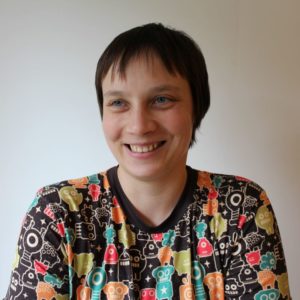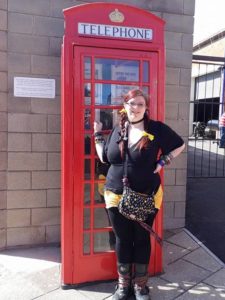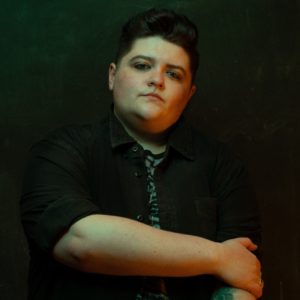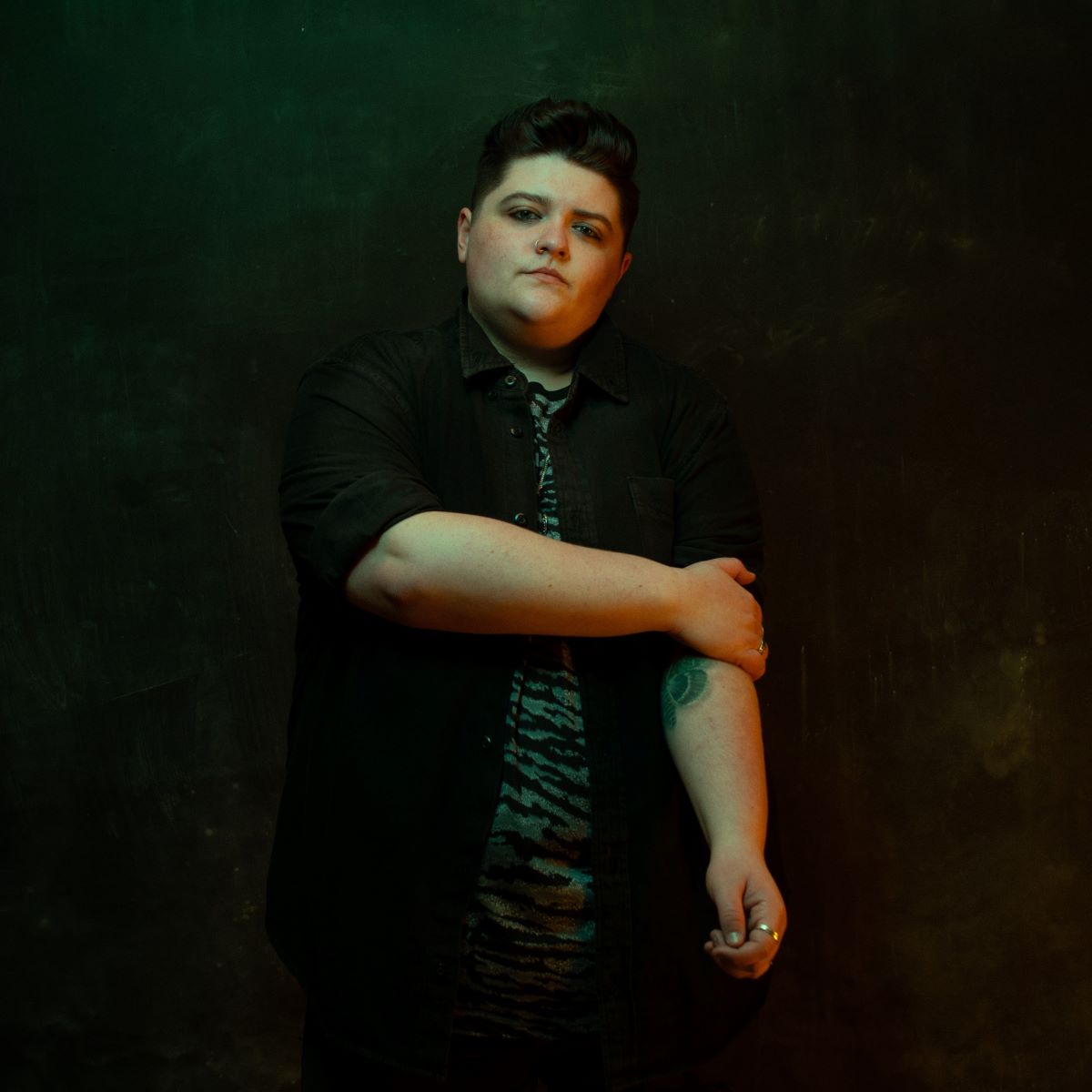by Sally Churchward.
“I’d draw my own box and tick that.”
B Parsons, a gender queer non-binary drip artist and performance poet from Winchester. They/their/them.
“Before, I tried out different terms for myself, but I didn’t identify with them. When non-binary was put to me, I realised ‘That’s my box!’ In the early days, you didn’t get a box for ‘other’ for gender on forms. I’d get a biro, draw my own box, write ‘other’ on it and tick that. People would be like ‘you can’t do that’ and I’d say, ‘well I’m not one of the others, so I’m not ticking one of them’.
 “The first time I ever questioned my identity was when, as a kid, I’d just fallen out of a tree and a nail had gone through my foot. I remember, looking down and rather than panicking about the nail that was sticking out of my trainer, looking at body and thinking ‘I don’t know if I should be a boy or a girl’.
“The first time I ever questioned my identity was when, as a kid, I’d just fallen out of a tree and a nail had gone through my foot. I remember, looking down and rather than panicking about the nail that was sticking out of my trainer, looking at body and thinking ‘I don’t know if I should be a boy or a girl’.
“When I was growing up, I flitted between identifying as gay, bi and straight. I’d only heard ‘queer’ being used as a derogatory term. Then, around four years ago, I was taken as a birthday treat to a talk by Kate Bornstein. At the beginning, there was an icebreaker and people were talking about breaking down the binary and being gender queer. I sat listening in dead silence, thinking ‘shit, that’s me’ and trying out they/their/them over and over in my head, thinking ‘this feels right’. Then it was time to introduce ourselves. I was born Rebecca. I’m not a Becky. I tried out the letters of my name and thought ‘B!’. So when I stood up, I said ‘my name is B and my pronouns are they/their/them’. I was there with my ex-partner and when I sat down, they looked at me and said ‘what?.
“Since then, I’ve felt much more comfortable with my sense of myself as queer, and being an artist makes me feel more confident in myself. It took a long term relationship ending, for unrelated reasons, for me to feel more comfortable in trying out new things, in the way I dress and things like wearing a binder. It took a long time for me to feel I can do what I want and not ask permission. As a child, I didn’t have much autonomy or control of my choices.
“I’m in a process. Because of the upbringing I had – I was sexually abused by three men – I’m aware of my anxieties and the lack of control I had as a child. There are things I would like to do to my body – in my mind, I see myself as flat-chested – but I am doing trauma work to see if that’s down to my identity or tied up with the abuse. I don’t know if I need to modify my body to match my mind or it’s because I still have an ongoing relationship with the abuse, so that’s something I’m taking time to understand.
‘It’s not up to minorities to educate the masses’
“Being gay or non-binary shouldn’t be a political statement. It’s so freeing when someone asks you your pronouns or when I say what they are and they just use them. When I really feel seen, that’s where I find my freedom. When people think they can ask what’s between your legs, that’s when you start realising how much freedom you don’t have. It amazes me what people feel they have a right to question. People feel they can start asking you lots of questions. But it’s not up to the minorities to educate the masses. Just because you don’t understand something, doesn’t mean you have the right to start prying. Then some people will want to try to have an argument with you about it.
“I wear a badge with my pronouns on it. Find me a cis woman who has to wear she/her pronouns on a badge! I’ve felt seen by partners and some friends but where I live, my pronouns are often ignored or people say things like ‘I know that’s how you see yourself, but it’s easier for me to call you this’.
“It concerns me that non-binary people get put under the trans flag – not that many people even know that we have our own flag. We all need to be seen. It’s like some people used to think that being bisexual was a step towards being gay. But I know what I am, and I’m not a binary gender. I’m non-binary.”
Visit B Parson’s website: https://thedripartist.uk/
“I came out to my husband with a PowerPoint presentation”
Robin Swift, a creative developer at an advertising agency, from Southampton. They/their/them.
“At university, a friend came out as transgender. It made a lot of sense to me and I wondered if I might be transgender but I don’t identify as a man and I dismissed it. Then I read about non-binary identity and it resonated with me a lot but I didn’t take any action. It wasn’t hugely accepted, and I couldn’t see any benefit to me from it. But over a couple of years, I felt more and more like I was hiding an aspect of myself, like I was keeping a secret and I finally came out to my husband and friends.
 “It’s been a gradual process and people have been accepting for the most part. I went on to take further steps to align the way I present to the way I feel. I changed my name to a gender-neutral name, I changed my appearance to look more masculine and I asked people to use they/their/them pronouns. As it’s gone along, I’ve felt more authentic in my body and more confident in myself, although I have had difficulties with others not understanding and not using my pronouns and name.
“It’s been a gradual process and people have been accepting for the most part. I went on to take further steps to align the way I present to the way I feel. I changed my name to a gender-neutral name, I changed my appearance to look more masculine and I asked people to use they/their/them pronouns. As it’s gone along, I’ve felt more authentic in my body and more confident in myself, although I have had difficulties with others not understanding and not using my pronouns and name.
“My relationship with my husband was one one of the main thing that stopped me from revealing that I was non-binary sooner, as it had the potential to end our relationship. My change in identity had to potential to change his, from a straight man to something that there isn’t even a name for. But eventually, the pain of hiding it from him was too much and I realised that if it ended our relationship, that was what would have to happen, because I couldn’t continue as I was. I came out to him in a PowerPoint presentation. He received it really well. He wasn’t concerned about labels. He is in a monogamous relationship with me, and his sexual preferences don’t come into it. Over time he’s come to use my pronouns and new name, and I’m really happy that he’s been so supportive and accepting, even if he hasn’t always entirely understood what’s going on.
“There are lots of different identities under the non-binary umbrella and if I had to choose one of them, it would be agender, as I don’t really identify with any gender. We all experience gender in different ways, and I’m leaning towards the lack of gender, rather than bi-gender, poly-gender or third gender.
‘One person’s fun philosophical argument is your whole life’
“I find there are definitely people who expect me to know everything about being non-binary and there’s pressure to be an educator. There’s an extent to which I’m happy to do that to help others, but it’s a lot of work for me in a way that I don’t think it is if you come out as gay or lesbian – you don’t have to explain that. It is very tiring but I have a good support network including friends who are trans and non-binary and that really helps, as does having people explain for you, so you don’t have to do all the work.
“There is this expectation that we have to be experts on non-binary identity and have all the arguments to hand, but one person’s fun philosophical argument is your whole life – to have people talking about it as a hypothetical situation when it’s your reality is quite frustrating. It also baffles me when people say that non-binary doesn’t exist. We are clearly here. There are a lot of us. That expectation for me to give them every fact and argument, that’s their problem to spend time on, not mine.
“People read me as a woman straight away so I don’t get asked what I am ‘really’ but my goal is to look androgynous, so I guess that will be something further down the line. If I do achieve the look I want, people will ask what’s in my pants, because that’s something non-binary and trans people get – people asking about your genitals. It’s so inappropriate. I try to give people the benefit of the doubt, that they’re probably not educated about this, and I have to know where to spend my energy, so I don’t get into a discussion with some rando on the internet, who doesn’t deserve my attention. People seem to have a sense of entitlement to read your gender – it’s troubling.
“I think since realising that I’m non-binary, I’ve become more interested in learning about other minority experiences. Before, I was a straight white woman; I never ran into many prejudices other than sexism (which still happens). Now that I’m non-binary, I’m in a minority and I empathise more with other minorities – people of colour, trans people, people with autism, with mental health issues etc. I try to keep myself more educated now. I wouldn’t call myself an activist but I will challenge people on things now, whereas before I would probably have kept quiet.
“I’m more political now than I was before the politics affected me. The people who aren’t political tend to be the people who aren’t affected by politics and that was me. Was I a bad person? I feel I have improved in trying to be more empathetic towards other people, not just non-binary people, but everyone.”
‘When people ask if I’m a girl or a boy, I say ‘I’m a Fraggle’.’
Beck Alsford, a student from Southampton. They/their/them.
“I always wore ‘boys clothes’ and played with things like tanks but it wasn’t until I went to some psychology lectures at university and started to think about how some things didn’t fit that I started to wonder if my inside and outside didn’t fit. I went along to Chrysalis (a charity which supports transgender and questioning people and their families and close friends) and said that I thought I should have been born a boy. Then a year or so later, I started questioning the notion of gender. I don’t think I ever identified as anything, never as a woman. At first I took that to mean that I must identify as a man but then I realised that I was non-binary.
 “I don’t feel I need to have surgery and change my body to look different. If we spend our time worrying about how other people think about us, we won’t focus on how we feel about ourselves. I don’t like the thought of surgery anyway and why should I risk that, just so I can fit other people’s gender expectations?
“I don’t feel I need to have surgery and change my body to look different. If we spend our time worrying about how other people think about us, we won’t focus on how we feel about ourselves. I don’t like the thought of surgery anyway and why should I risk that, just so I can fit other people’s gender expectations?
“I grew up in Portland and because of the TV show Fraggle Rock, when I went to university, people called me Fraggle, and that’s been my nickname since. When people ask me if I’m a girl or a boy, I say ‘I’m a Fraggle. They don’t have a gender’.
“I am disabled and have mental health issues, and I have had more problems with prejudice over those things than with being non-binary. But there can be issues. Even at Pride, I’ve been called ‘Madam’ and there’s no need for that. My family doesn’t understand it. It’s different in Portland – it’s a less culturally-diverse place than Southampton. Southampton is pretty good. It used to be a problem, with people being beaten up, but generally it feels pretty safe. People come here for university, learn more about the world and other people, and then stay here.”
‘Instead of respecting a human being, people fixate on grammar’
Beck Lombardi, Lead singer of Hunting Hearts and an NHS software specialist at Southampton General Hospital, from Southampton. They/their/them.
“I’d heard of male to female and female to male transitioning, but I hadn’t considered that someone could be non-binary. It took until my 20s to realise that it was possible. It happened when I saw a non-binary character on a show I was watching and realised ‘that’s me’. I changed the words I use to describe myself – my name and my pronouns – and those changes have made me so much more comfortable. Now that I accept and understand my personal experience of being non-binary, I feel more comforable identifying with feminine things, like make up.

“It can be hard getting people to accept you as non-binary. When you’re non-binary, it’s as if the respect that should be given to you is denied to you over something as trivial as grammar. People have the opportunity to respect a human being and instead they fixate on grammar – they/their/them. I point out to people that they don’t have difficulty using those words when they’re talking about someone whose gender they don’t know. Language evolves. We don’t speak in Shakespearian English anymore, so why get hung up on the words? It’s got nothing to do with the words, it’s about not understanding the concept and not respecting the people. Gender is a sliding scale, not really a binary, so some people identify with the extremes of the poles and others don’t.
“Because there’s only one way to be completely privileged, which is as a white, wealthy, cis, straight male, there are so many ways to be disadvantaged. People are pushed to split up and focus on their own struggles, which can be damaging – ‘you think you’ve got it bad, but what about these people’. But we need to work against that. I have no idea what it’s like to be a disabled or black transwoman. I have to make sure I’m aware of my privilege, listen to other people and modify what I believe.
“When I came out as bisexual, when I was 15, it was a bit difficult, so when I was getting ready to talk about my gender, I had periodic conversations with people, about how I was struggling with words people used about me. When I was coming out, I realised what was true about me as I was having the conversations, so I was sort of coming out gently to people all over the place. Then, on Non-Binary Visibility Day two or three years ago, I announced it. Most people said ‘cool, I’ll probably slip up sometimes’ but others were like ‘OK, can I still call you this?’ and the answer was ‘no, you can’t’. Lots of people call me ‘she’, some of whom know I’m non-binary and some of whom don’t. I find it difficult to correct people, so sometimes I don’t say anything but then feel upset about it. But it shouldn’t be up to me to have to keep telling people – it’s up to them to remember it.
“A big problem is with people not accepting that being non-binary is a real identity. Often the narrative that comes up is that being non-binary is a phase, a joke or ‘social justice gone mad’. So many cis people say things like ‘I identify as a helicopter’ that it’s now just become a joke within the non-binary community. We’re here, we’re not going anywhere, learn to respect our pronouns. We don’t need your validation to validate ourselves or each other.
“Pronouns just are. You don’t need to earn the right for them to be respected and if someone does something bad, you don’t stop using them. There’s the sense sometimes that as long as you fit someone’s criteria for a good person, they’ll treat you like a human being, but the moment you step out of line, you become an abstract and offensive concept, and they will treat you like that.
“It’s important to take someone’s identity at their word. Identity is fluid, so it may change and it may come to a resting point, or it may not. Some people may come out as non-binary and then move to agender etc. It’s important to keep dialogue open and respect people’s pronouns. If you make a mistake, don’t obsess over it. Correct yourself and move on. When people obsess, it makes us feel like a burden. So move on and put the steps in place not to do it again.”
- Beck’s band, Hunting Hearts, is launching a crowdfunder, to cover the costs of launching its debut album. The funder will launch on October 31 through the band’s Facebook page, with rewards including limited edition artwork and merchandise. For more information, visit: www.facebook.com/HuntingHeartsUK/

